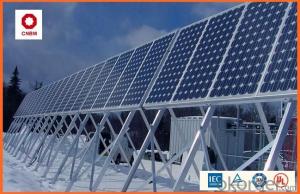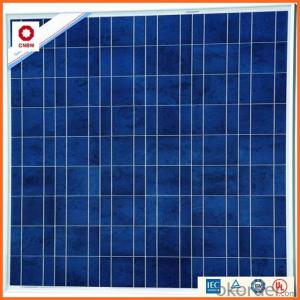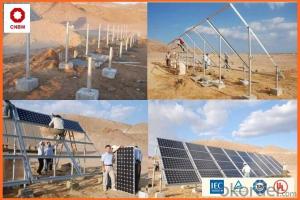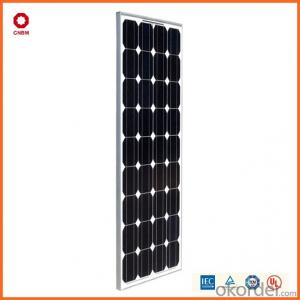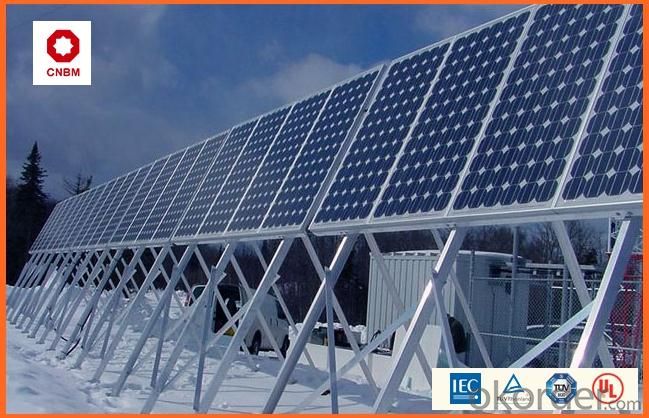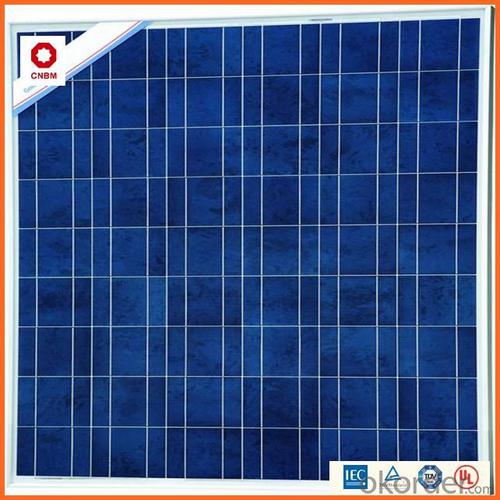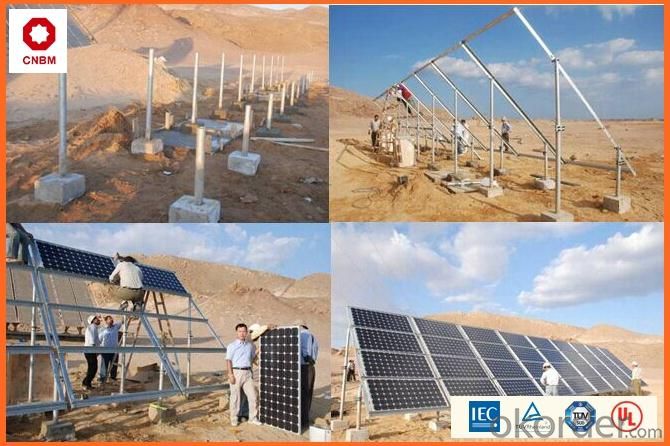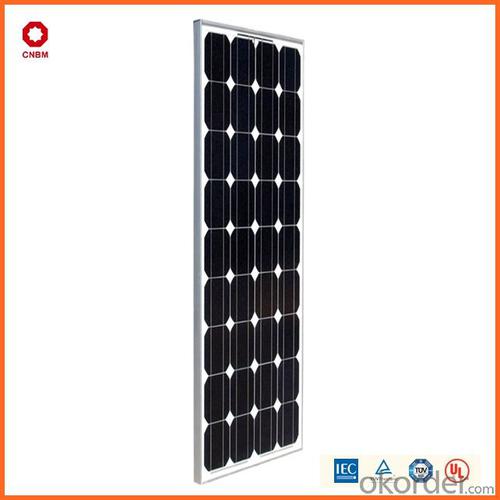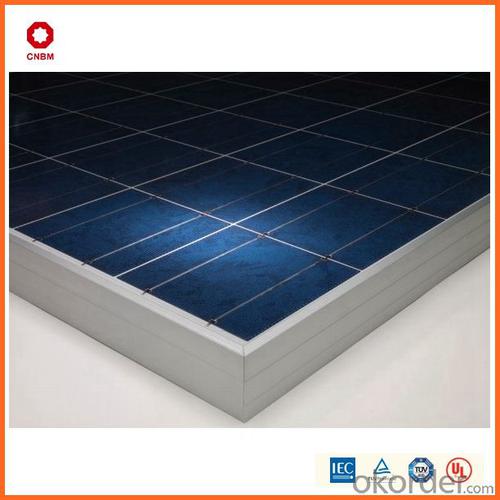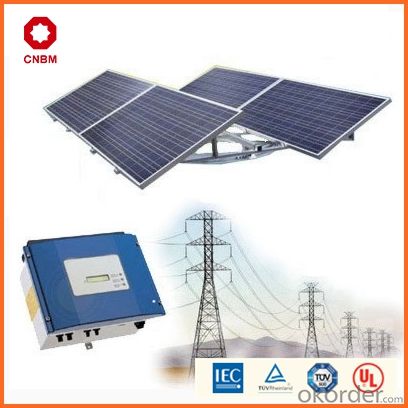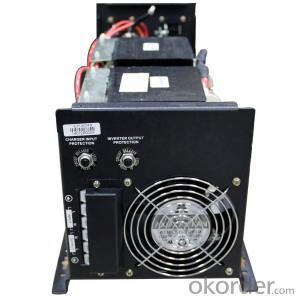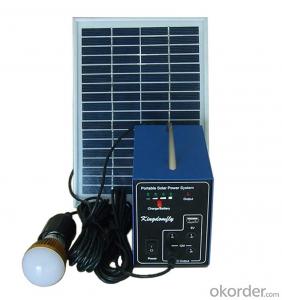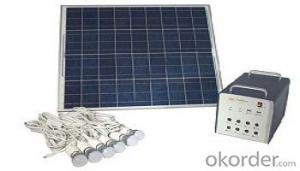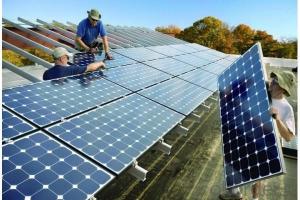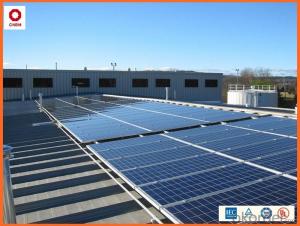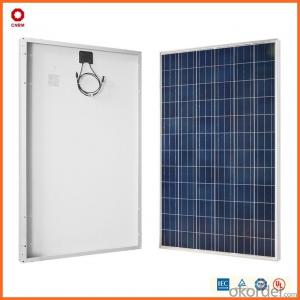Sirius Solar Energy Systems 105w Small Solar Panels in Stock China Manufacturer
- Loading Port:
- China main port
- Payment Terms:
- TT OR LC
- Min Order Qty:
- 1 watt
- Supply Capability:
- 10000000 watt/month
OKorder Service Pledge
OKorder Financial Service
You Might Also Like
Specification
Product Description:
Hot Sale !!! Quality and Safety of Small Poly Solar Panel 5w~150w
1. Rigorous quality control meets the highest international standards.
2. High-transmissivity low-iron tempered glass, strong aluminium frame.
3. Using UV-resistant silicon.
4. IS09001/14001/CE/TUV/UL
Warranties of Small Poly Solar Panel 35~85w
1. 10 years limited product warranty
2. 15 years at 90% of the minimal rated power output
3. 25 years at 80% of the minimal rated power output
Specification
Characteristics of Poly solar panels CNBM (245-320W) | |||||
Max Power Voltage Vmp(V) | 30.3 | 30.8 | 31.1 | 31.4 | 31.85 |
Max Power Current Imp(A) | 7.60 | 7.64 | 7.73 | 7.81 | 7.85 |
Open Circuit Voltage Voc(V) | 36.1 | 36.6 | 37 | 37.3 | 37.68 |
Short Circuit Current Isc(A) | 8.50 | 8.55 | 8.65 | 8.75 | 8.85 |
Max Power Pm(W) | 230W | 235W | 240W | 245W | 250W |
Temperature Coefficient of Cells Poly solar panels CNBM (245-320W) | |
NOCT | 45± 2 |
Temperature Coeffucients of Isc | 0.0492 |
Temperature Coeffucients of Voc | -0.3374 |
Temperature Coeffucients of Voc | -0.4677 |
Mechanical Data of Poly solar panels CNBM (245-320W) | |
Dimension | 1638 × 982 × 40 mm |
Weight | 19.5 kg |
No. of Cells and Connections | 60 (6 ×10) |
Tolerance | 0 ~ + 5 W |
Cell | Monocrystalline Cell 156 × 156 mm |
Packing | 624 Pcs/40ft(H) Container |
Limits of Poly solar panels CNBM (245-320W) | |
Operating Temperature | -40 to +85 |
Storage Temperature | -40 to +85 |
Max System Voltage | 1000VDC(IEC) / 600VDC(UL) |
Features of our products:
• High conversion efficiency mono/poly-crystalline amorphous silicon solar cells
• Modules incorporate high performance bypass diodes to minimize the power drop caused by shading
• High transmittance, low-iron tempered glass
• High performance EVA encapsulant to prevent destroying and water.
• AI frame: without screw, corner connection. 8 holes on the frame can be installed easily
• Good performance of preventing from atrocious weather such as wind and hails
• Certifications: CE IEC TUV VDE UL, Class I
• 10 years 90% power output warranty

Shipping of Small Poly Solar Panel 35~85w
By Sea | Delivery from Shanghai or Ningbo seaport |
By Air | Departure from Shanghai Pudong Airport |
By Express | Post by DHL, EMS, UPS, TNT. |
Features of our products:
• High conversion efficiency mono/poly-crystalline amorphous silicon solar cells
• Modules incorporate high performance bypass diodes to minimize the power drop caused by shading
• High transmittance, low-iron tempered glass
• High performance EVA encapsulant to prevent destroying and water.
• AI frame: without screw, corner connection. 8 holes on the frame can be installed easily
• Good performance of preventing from atrocious weather such as wind and hails
• Certifications: CE IEC TUV VDE UL, Class I
• 10 years 90% power output warranty
As a professional Solar Panel manufacturer and Supplier in China, we have our customers come around the whole world and our specialization has got a worldwide recognition. Meanwhile, with our superior quality, competitive price, prompt and excellent service, As main role in trade section of CNBM Group, CNBM International Corporation supplies products including Monocrystalline Solar Panel, Polycrystalline Solar Panel ( multicrystalline silicon Solar Panel) have received and enjoyed famous reputation in many countries and regions in the world.
- Q: What is the average payback period for a solar energy system?
- The average payback period for a solar energy system varies depending on various factors such as the system's size, location, installation costs, energy usage, and available incentives. However, on average, a residential solar energy system can pay for itself within 6 to 10 years, while commercial systems may have a payback period of 4 to 8 years. It's important to note that with advancements in technology and decreasing installation costs, the payback period for solar systems is continually decreasing, making it a more financially viable option for many.
- Q: Can solar energy systems be used in powering recycling plants or waste management facilities?
- Yes, solar energy systems can definitely be used to power recycling plants or waste management facilities. Solar energy systems harness the power of the sun to generate electricity, which can be used to operate various equipment and machinery in these facilities. Recycling plants and waste management facilities typically require a significant amount of energy to power their operations, including sorting and processing machines, conveyor belts, and other equipment. By installing solar panels on the roofs or in the vicinity of these facilities, they can generate clean and renewable electricity to significantly reduce their reliance on traditional energy sources. Solar energy systems offer several advantages for recycling plants and waste management facilities. Firstly, they provide a reliable and consistent source of energy, as the sun is abundant and available in most regions throughout the year. Unlike fossil fuels or other non-renewable energy sources, solar energy systems do not deplete natural resources or contribute to greenhouse gas emissions, making them environmentally friendly. This aligns with the sustainability goals of recycling plants and waste management facilities, which are focused on reducing the environmental impact of waste management processes. Additionally, solar energy systems can help these facilities save on energy costs. Once the initial investment in solar panels is made, the ongoing operational costs are relatively low. Furthermore, some regions offer incentives and financial support for the installation of solar energy systems, which can further offset the initial investment and make it more financially attractive. Furthermore, recycling plants and waste management facilities often have large surface areas available for solar panel installations, such as rooftops or open fields. This makes it easier to install a sufficient number of solar panels to meet the energy demands of these facilities. In some cases, excess energy generated by the solar panels can even be fed back into the electrical grid, allowing the facilities to earn revenue from the surplus electricity. In conclusion, solar energy systems can be effectively used in powering recycling plants or waste management facilities. They offer a sustainable and cost-effective solution, reducing reliance on traditional energy sources while helping these facilities achieve their environmental goals.
- Q: Can solar energy systems be used in areas with limited space?
- Yes, solar energy systems can be used in areas with limited space. There are various options available such as rooftop solar panels, solar carports, and even solar-powered windows, which can effectively harness solar energy in compact spaces. Additionally, advancements in technology have led to the development of smaller and more efficient solar panels, allowing for installation in areas with limited surface area.
- Q: Can solar energy systems generate enough electricity to power a home?
- Yes, solar energy systems can generate enough electricity to power a home. With advancements in technology, solar panels are capable of producing sufficient electricity to meet the energy needs of a typical household. However, the effectiveness of the system may depend on factors like the size of the solar installation, the location and climate, and the energy consumption patterns of the home.
- Q: Can a solar energy system be financed through a loan?
- A loan can be used to finance a solar energy system. Numerous financial institutions provide loans specifically for renewable energy projects, such as solar energy systems. These loans are intended to assist individuals and businesses in covering the initial expenses of purchasing and installing solar panels and associated equipment. In certain instances, these loans may be secured by the solar energy system itself, permitting the lender to assume ownership if the borrower fails to repay the loan. The terms and conditions of these loans will vary based on the lender, but they generally offer competitive interest rates and flexible repayment choices. Furthermore, there might be several government incentives and tax credits accessible to further reduce the cost of financing a solar energy system. All in all, financing a solar energy system through a loan can be a feasible and financially beneficial choice for those interested in investing in renewable energy.
- Q: How does the tilt angle of solar panels affect energy production?
- The tilt angle of solar panels significantly affects energy production. By adjusting the tilt angle, solar panels can optimize their exposure to sunlight and increase energy production. The ideal tilt angle differs based on the geographical location, time of year, and specific installation. Generally, tilting the panels towards the equator at an angle equal to the latitude helps maximize energy generation. However, a steeper tilt angle during winter months can enhance production by capturing more sunlight. Overall, adjusting the tilt angle is crucial for maximizing the efficiency and output of solar panels.
- Q: Are there any financial incentives for installing solar energy systems?
- Yes, there are several financial incentives available for installing solar energy systems. These incentives include federal tax credits, state and local rebates, grants, and loan programs. Additionally, installing solar panels can lead to long-term cost savings on electricity bills, as solar energy is renewable and reduces reliance on traditional energy sources.
- Q: Are there any risks of electrical shock with solar energy systems?
- Solar energy systems carry potential risks of electrical shock. While generally considered safe, these systems can be hazardous due to the presence of high voltages and electrical currents. Failure to handle or manage them properly can result in accidents. Several key risks are associated with solar energy systems: 1. Installation and maintenance: Improper procedures during the installation and maintenance of solar panels can lead to contact with live electrical components. This can happen when safety protocols are not followed or when untrained individuals attempt to handle electrical connections. 2. Equipment or wiring malfunctions: Defective inverters, wiring, or other equipment can increase the risk of electrical shock. Poor installation practices or insufficient maintenance can also result in electrical faults, exposing individuals to dangerous currents. 3. Fire hazards: While not directly related to electrical shock, faulty electrical components or wiring can raise the risk of fires in solar energy systems. Attempting to extinguish such fires without shutting down the electrical system first can further worsen the risk of electrical shock. To minimize these risks, it is essential to adhere to proper installation and maintenance procedures. This often involves seeking assistance from licensed professionals. Furthermore, individuals working with solar energy systems should be trained in safety protocols, including the use of appropriate personal protective equipment and ensuring proper grounding of electrical systems. Regular inspections and maintenance are also crucial to detect and address any potential electrical hazards.
- Q: Can solar energy systems be used in agricultural settings?
- Yes, solar energy systems can be used in agricultural settings. They can be used to power irrigation systems, provide electricity for farm operations, and even generate heat for greenhouses. Solar energy offers a sustainable and cost-effective solution for meeting energy needs in agriculture while reducing reliance on fossil fuels.
- Q: Do solar energy systems require specialized cleaning?
- Yes, solar energy systems do require specialized cleaning. While solar panels are designed to be self-cleaning to some extent, they can still accumulate dirt, dust, pollen, bird droppings, and other debris over time, which can reduce their efficiency. Regular cleaning is necessary to ensure optimal performance. However, cleaning solar panels can be a delicate task, as they are made of sensitive materials. Using the wrong cleaning products or techniques can damage the panels and void their warranty. Therefore, it is recommended to hire professionals or follow the manufacturer's guidelines for cleaning solar energy systems.
Send your message to us
Sirius Solar Energy Systems 105w Small Solar Panels in Stock China Manufacturer
- Loading Port:
- China main port
- Payment Terms:
- TT OR LC
- Min Order Qty:
- 1 watt
- Supply Capability:
- 10000000 watt/month
OKorder Service Pledge
OKorder Financial Service
Similar products
Hot products
Hot Searches
Related keywords
